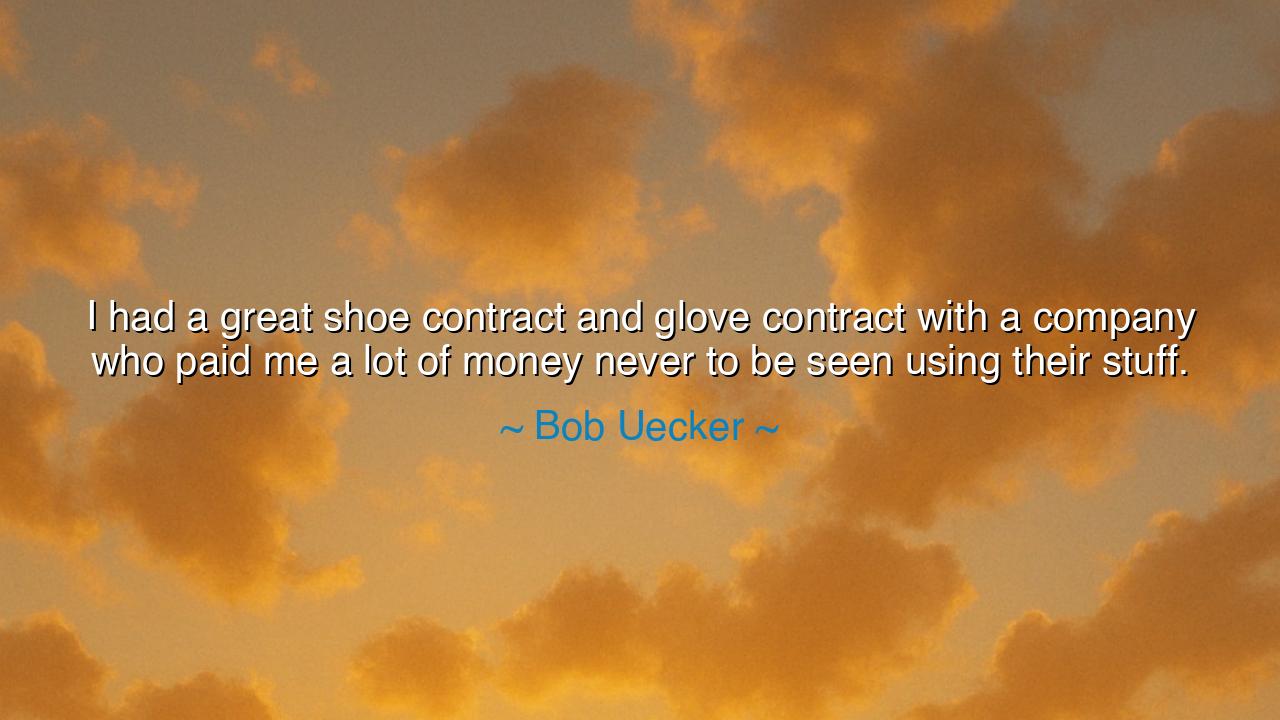
I had a great shoe contract and glove contract with a company who
I had a great shoe contract and glove contract with a company who paid me a lot of money never to be seen using their stuff.






When Bob Uecker quipped, “I had a great shoe contract and glove contract with a company who paid me a lot of money never to be seen using their stuff,” he was not merely making a joke — he was offering a lesson cloaked in humor, a truth about humility, failure, and the strange grace of imperfection. Beneath the laughter lies the wisdom of a man who understood that greatness is not always measured in glory, and that even in shortcoming, one may find purpose, joy, and meaning. His words remind us that to laugh at oneself is not weakness but strength, for it frees the soul from the tyranny of pride.
The origin of this saying comes from Uecker’s days as a professional baseball player in the 1960s. Though he stood among giants, his own career was modest — a catcher whose batting average rarely startled the record books. Yet rather than retreat in bitterness, he chose to embrace his missteps with wit. The glove and shoe companies, as he joked, paid him to avoid using their products — for to see him fail with their gear would be poor advertising! In this irony, Uecker found a way to turn his flaws into laughter, transforming what others might hide into a badge of honesty. His humor, gentle and self-deprecating, became the foundation of a later career in broadcasting and comedy, where his candor and charm won the hearts of millions.
But the quote’s deeper meaning extends beyond the baseball diamond. It speaks to the universal truth that not every life is marked by triumph — and that this, too, is noble. In the ancient world, the philosophers taught that to know oneself was the highest wisdom. So it is with Uecker: he knew his limits, and rather than curse them, he celebrated them. There is a dignity in self-awareness, a rare courage in admitting imperfection without surrendering joy. The wise do not measure life only by success, but by the lightness with which one bears defeat.
Consider the story of Diogenes the Cynic, the philosopher who lived in poverty and mocked the pretensions of the powerful. When Alexander the Great, ruler of the known world, stood before him and asked, “What can I do for you?”, Diogenes replied, “Stand out of my sunlight.” Like Uecker, he turned his lack into liberty — refusing to envy those who surpassed him in wealth or status. Such men remind us that freedom lies not in achievement, but in self-acceptance. To laugh at oneself is to deny the world the power to shame you. In humor, one becomes unconquerable.
There is also in Uecker’s quote a sly reflection on the absurdity of fame and fortune. A company pays him — not to use their products — and yet he profits. The world, he implies, often rewards image more than substance, illusion more than reality. It is a reminder that vanity governs much of human commerce, and that wisdom lies in seeing through it. By making sport of this absurdity, Uecker exposes the emptiness of pretense while reminding us to hold our ambitions lightly. The truly wise do not chase every glittering reward; they learn to smile at the folly of the chase itself.
Yet Uecker’s laughter is not bitter — it is generous, born of gratitude. He does not curse his lack of talent; he delights in the life it gave him. His humor is a bridge between failure and peace, showing that joy is a choice, not a consequence. In a world obsessed with winning, he reminds us that character shines brightest when the spotlight has passed. To lose with grace, to live with laughter — this is a triumph of the heart far greater than any victory on the field.
So, my child, take this lesson from the wit of Bob Uecker: never fear your flaws, and never despise your defeats. If your path is humble, walk it with laughter; if your hands fall short, let your heart reach higher. The wise man does not demand perfection of himself — he transforms imperfection into light. Learn to smile at your stumbles, for they make your story human, and therefore beautiful. In the end, the world may not remember your victories, but it will never forget your courage to laugh — to stand before life’s absurdities and say, as Uecker did, with humor and humility: “Yes, they paid me not to use it… and I’m still grateful.”
For in that laughter lies the secret of peace — the knowing that while skill may fade, spirit endures, and that the one who can smile at himself has already won the game that truly matters.






AAdministratorAdministrator
Welcome, honored guests. Please leave a comment, we will respond soon